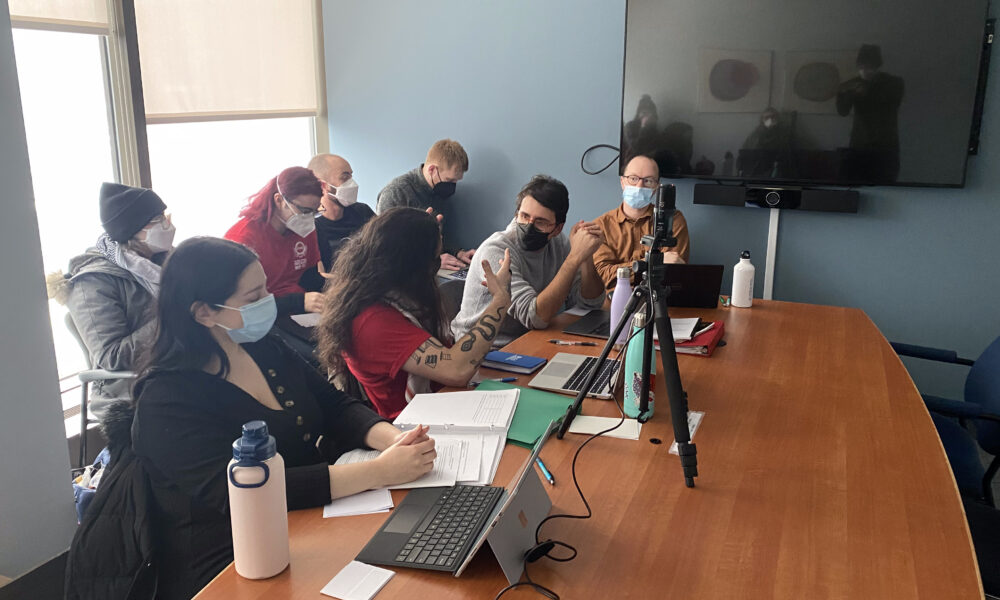The Association of Graduate Students Employed at McGill (AGSEM) and McGill proceeded with their ninth round of negotiations on Jan. 16. Following the expiration of AGSEM’s last teaching assistants’ (TA) collective agreement with the school in July 2023, negotiations have been ongoing, largely focusing on AGSEM’s non-monetary demands. On Dec. 18, the association presented its monetary proposal to the university.
Before the negotiation meeting started, AGSEM held a rally in front of Roddick Gates where members chanted and spoke to students about the organization’s demands. According to a press release, AGSEM’s monetary proposal consists of increasing TA wages to levels comparable with the wages of TAs at other large Canadian universities and implementing a cost-of-living adjustment in years when inflation exceeds three per cent. Additionally, the union requests that the number of hours that TAs work be indexed to the number of students enrolled in the class. Lastly, the proposal also includes a request for three separate healthcare funds, dedicated to general healthcare, gender-affirming healthcare, and healthcare for international TAs.
One of the members present at the rally, Emma McKay, a PhD student in the Department of Integrated Studies in Education (DISE) and the Chief Delegate Mobilization at AGSEM explained in an interview with The Tribune that they are interested in seeing McGill’s monetary proposal.
“What we’re most hoping to hear in this negotiation session is McGill’s counteroffer for our monetary proposal,” McKay said. “How much, in terms of hourly wage, are they willing to offer us out of the gate? In terms of healthcare, are they willing to even consider it? Indexing TA hours to student enrolment, are they even willing to consider that or a modification of it?”
The union’s expectations, outlined by McKay, were not met in the negotiation session. According to AGSEM, McGill was unable to provide a monetary counteroffer at Tuesday’s meeting. According to a press release, McGill’s representatives used the meeting’s time to comment on the proposal made by the union at their previous meeting.
McGill pointed to differences in the Quebec labour market as a justification for the difference in TA wages compared to other Canadian universities. AGSEM responded to this argument by noting McGill’s professed self-inclusion in the “Canadian Ivy League” as a context in which they are comfortable comparing the school to its Canadian counterparts.
According to AGSEM, the current wage of a TA at McGill is $33.03 per hour, compared to $40 to 50 per hour at other Canadian universities such as University of Toronto and Queen’s University. But Queen’s University TA Tai Withers, MSc candidate and member of Public Service Alliance of Canada 901, maintains that their TA wages are not sufficient to cover the rising cost of living in Kingston, Ontario, where the university is located. In an interview with The Tribune, Withers also stated that the workload as a TA can become overwhelming when combined with research and coursework as a graduate student.
“If you isolate the TA workload, I think that’s fair. In combination with being a graduate student I think it can certainly be more than is entirely reasonable” said Withers.
At the rally preceding the negotiation, Dallas Jokic, PhD candidate in philosophy and member of AGSEM’s bargaining committee spoke about the unique case of Quebec when it comes to the rising cost of living.
“I think McGill has always advertised itself as ‘Oh, Montreal is so affordable’, but as
we all know the cost of living is getting so much more expensive here. The cost of living is
rising faster in Montreal than almost any other city in Canada,” Jokic said.
The Canadian Press reported that rents are increasing at a faster rate in Quebec than in the rest of the country.
As discussions moved in the direction of the proposed healthcare funds, McGill
asserted that the coverage currently provided to graduate students at large is already more expansive than that offered to the majority of McGill employees.
The university expressed an understanding of AGSEM’s desire for a cost-of-living adjustment in years with high inflation. However, McGill said it was unable to meet the demand, citing the uncertain nature of economic activity.
McGill indicated that it plans to share its counter-proposal shortly.
McGill declined to comment on ongoing negotiations.







